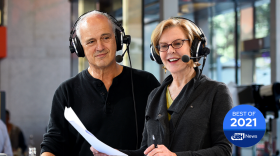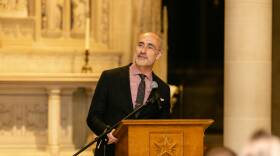EXPLORE MORE
Thursday on BPR:
Retired federal judge Nancy Gertner
Mauricio Rodriguez Pons, director of Frontline and ProPublica’s latest film “Status: Venezuelan”
NBC Sports Boston's Trenni Casey
MIT economist Jon Gruber
Recent segments
-
Ask The Mayor: Wu confident in proof-of-vaccination requirement
"If we do nothing ... businesses will have to shut down." -
How to plan work around your life, not the other way around
Charlie Warzel, an author and Atlantic newsletter writer, talks about the issues with modern work -
Top 5 Boston Public Radio segments from 2021
Listen to the top five Boston Public Radio conversations from 2021. -
The secret to happiness is more in your hands than you think, according to Arthur Brooks
Here are his tips on how to find happiness in an increasingly unhappy world -
Is Gen Z less religious? Not necessarily, say the Revs. Irene Monroe and Emmett G. Price III
“They're bringing their parents’ tradition, but revising it in a way that is far more inclusive,” Monroe explained. -
A puppy as a present? MSPCA director explains the do's and don'ts of holiday pet adoption
The most important factor is that pets are not gifted to someone who did not ask for one or who is not expecting a pet.
Listen to previous shows
-

Best Of BPR 9/14: Drew Faust On Growing Up At Midcentury & Whether Women Can "Have It All"
Best Of BPR 9/14: Drew Faust On Growing Up At Midcentury & Whether Women Can "Have It All" -

BPR Full Show 9/14: AITA For Having A 12 Foot Skeleton?
BPR Full Show 9/14: AITA For Having A 12 Foot Skeleton? -

BPR Full Show 9/13: Are Kids' Meals a Steal?
BPR Full Show 9/13: Are Kids' Meals a Steal? -

Best Of BPR 9/13: Steve Johnson On Seeking Justice For His Brother & Adults At The Kids Table
Best Of BPR 9/13: Steve Johnson On Seeking Justice For His Brother & Adults At The Kids Table -

Best Of BPR 9/12: Mayor Michelle Wu On Rent Control & MCAS Graduation Requirement Ballot Questions
Best Of BPR 9/12: Mayor Michelle Wu On Rent Control & MCAS Graduation Requirement Ballot Questions









